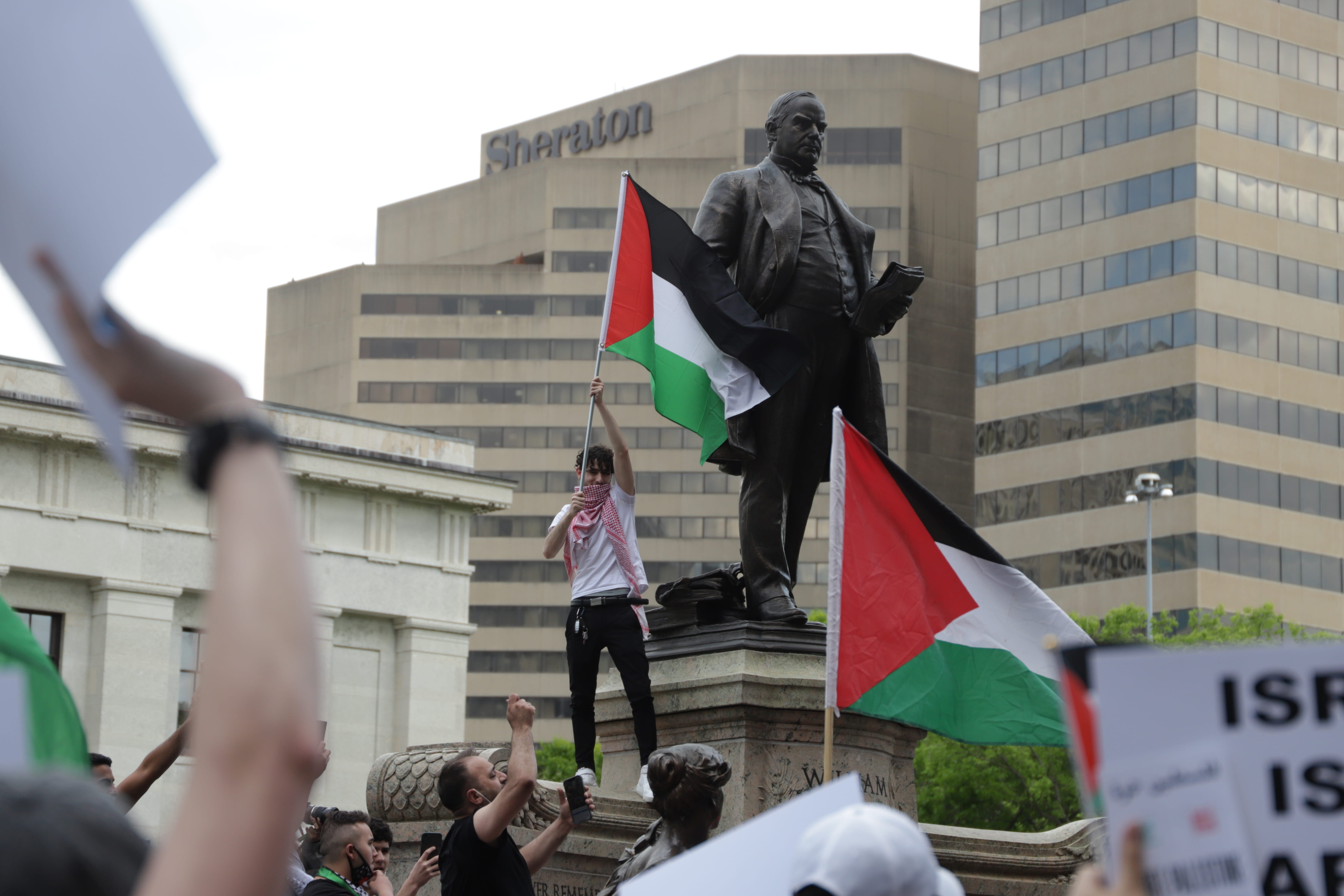
Around 500 protesters gathered outside the Columbus Statehouse in support of Palestine Friday. Credit: Mackenzie Shanklin | Photo Editor
Around 500 people gathered outside the Columbus Statehouse chanting to free Palestine, Gaza and Jerusalem Friday.
Jade Musa, a 2021 Ohio State graduate and one of the organizers of the event, said the goal of the protest was to stand in solidarity with Palestinians that are resisting in Palestine and the surrounding areas. She said protesters oppose U.S. foreign aid to Israel, mentioning its advanced military and “ethnic cleansing” in the region.
“You are invisible, and you don’t matter. And that’s why we’re marching today because it’s enough,” Musa said.
Yezen Abusharkh, a Palestinian Columbus resident who took part in organizing the protest, said the situation in Palestine has long been treated as a conflict that is too complicated for many to understand.
“That has been a tool used to gatekeep the issue and keep people from speaking out and trusting what they see with their own eyes, which is state violence against indigenous people who do not have the means to fight back against the nuclear power colonialist state that is oppressing and dispossessing and ethnically cleansing them,” Abusharkh said. “That sort of facade has started to break down and people are starting to wake up, and I think people need to be ready for more action on this.”
Coalition for Boycott, Divestment and Sanctions, Jewish Voice for Peace and Ohio State student organization Students for Justice in Palestine organized the event in light of the increased violence occurring in the Middle East, Musa said.
Musa said the protest was an open space for people to share their thoughts, with some former SJP presidents speaking at the event.
There were multiple speakers at the event who voiced their anxiety for family members currently facing violence in the region, talked about Palestinian solidarity and a Jewish speaker who spoke about his background and why he has chosen to “stand with the oppressed over the oppressor,” Abusharkh said.
“People were in solidarity,” Abusharkh said. “I think people, this past week due to the brave Palestinians on the ground sharing their stories in a way that sort of cuts through the bureaucracy of mainstream media, have really awoken, have spread the truth of what’s happening and really awoken the consciousness of the American people.”
Musa said the protest and the Palestinian liberation movement is not a religious issue, but a colonizer versus colonized people issue.
The protesters also marched through the Short North and by Goodale Park before returning to the statehouse.
Israel has been the site of violent confrontations between Israeli and Palestinian residents since the early 1900s. Britain took control of the area known as Palestine after World War I, which was inhabited by a Jewish minority and an Arab majority. After World War II, tensions between the two demographics increased when Britain named the land Israel, a home for the Jewish people. Palestinians also claimed the land, and a war ensued.
The land has been fought over for the last century, with several wars breaking out between the state of Israel and Palestine. On Wednesday, a Palestinian militant group called Hamas, which rules Gaza, launched missiles into Israel. Israel responded with its own military attacks. Since Monday, Gaza has seen at least 132 deaths and Israel has seen at least 8 deaths, according to Reuters.
According to a report from the Congressional Research Service, the U.S. has sent foreign aid to Israel since 1946, the majority of which is military assistance. In 2016, the U.S. and Israeli governments signed a 10-year memorandum of understanding, a document outlining the agreement of two or more parties, in which the U.S. will provide Israel $38 billion in military aid.
University spokesperson Ben Johnson said in an email the Multicultural Center offers programming and support for all Ohio State students, including its Palestinian students.
Musa said sometimes on Ohio State’s campus or in academia in general, there are no spaces for Palestinian students. She said this protest was an event where those students could feel supported.
“If for one day they can feel empowered, a little bit when all the odds are against them, I will be happy,” Musa said.
Mackenzie Shanklin contributed reporting.
Correction: a previous version incorrectly stated about one hundred Israeli civilians were killed from Wednesday’s missile attack on Israel. The story has been updated to reflect current known death counts since Monday. Also, a previous version misquoted Abusharkh to say “fake” rather than “state” violence.


